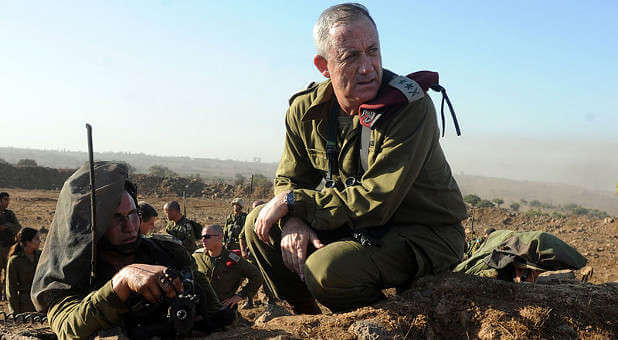IDF Chief of Staff Lt. Gen. Benny Gantz reaffirmed Tuesday Israel’s ability to mount a preemptive strike against Iran’s nuclear facilities on its own. Gantz, who gave a series of media interviews as part of Israel’s 65th Independence Day celebrations, was asked by Israel Radio if the Israeli military was capable of targeting Tehran’s nuclear facilities independently, to which he answered, “Unequivocally, yes.”
He further said that the IDF was monitoring the situation in Iran closely and that “we will know what to do when the time comes.”
Addressing reports suggesting that the military and political echelons disagree on various matters pertaining to the Iranian threat, Gantz said: “I don’t think ‘disagreement’ is the right word. We hold long and thorough discussions on the matter.”
Defense Minister Moshe Ya’alon, who hosted the Defense Ministry’s traditional public reception for Independence Day, said “the international community must take the lead in this standoff with Iran, but Israel must prepare for the possibility that it will have to defend itself, by itself.”
The ramifications of a nuclear Iran would be disastrous, he added. “A nuclear Iran would introduce an arms race in the Middle East and will enable terror groups to get their hands on nuclear weapons. That is the West’s worst nightmare,” Ya’alon said.
Also on Tuesday, the U.S. Senate Foreign Relations Committee adopted a resolution stipulating that the U.S. will assist Israel if it is forced to take action against Iran.
Resolution 65—named in honor of Israel’s 65th birthday—was co-sponsored by 79 senators and promises unconditional U.S. support if Israel attacks Iran. “The U.S. will assist Israel diplomatically, economically and militarily if the Jewish state is compelled to take military action against Iran in defense of its territory, people, and existence,” the resolution said.
“The Senate Foreign Relations Committee has sent a very clear and enormously important message of solidarity with Israel against the Iranian nuclear threat, which endangers American, Israeli, and international security,” the American Israel Public Affairs Committee said in a statement.
Meanwhile, head of the Iranian Nuclear Authority Fereydoon Abbasi said Tuesday that Iran has no plans to enrich uranium beyond 20 percent, but stressed that “in some cases, like ships and submarines that require small engines, we may need uranium enriched to 56 percent.”
This was the first time any Iranian official has made a public statement about the possibility that Tehran would pursue higher levels of uranium enrichment. Abbasi did not, however, say whether Iran would attempt to produce such nuclear fuel by itself or purchase it from foreign sources.
For the original article, visit israelhayom.com.















































